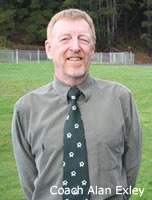Coach/Athlete Relationships
written by Pete
Van Mullem, Lewis-Clark State College in Lewiston, ID
 "Hopper,
you're the best," stated a tearful Alan Exley, giving
his induction speech into the Humboldt State University Athletics
Hall of Fame. Hopper was a long-time mentor and friend, and
Exley was conveying his thanks. Alan Exley had made a career
in coaching, spanning four decades, but on a night of celebration
he could barely finish a sentence. "Hopper,
you're the best," stated a tearful Alan Exley, giving
his induction speech into the Humboldt State University Athletics
Hall of Fame. Hopper was a long-time mentor and friend, and
Exley was conveying his thanks. Alan Exley had made a career
in coaching, spanning four decades, but on a night of celebration
he could barely finish a sentence.
Hidden inside the redwood forest of
Northern California, Coach Exley is the winningest men's soccer
coach in Humboldt State University history, leading the NCAA
DII institution to 171 victories. He retired in 2003, but
he continues to be the consummate coach, living for the game
and the game living through him.
It had been over eleven years since
I last spoken with or seen Coach Exley. At that time I was
a graduate assistant coach working in the athletic department.
Although, I have never seen him coach a game or witness a
practice, I remembered that he was well respected. However,
during this brief moment as Coach Exley reflected on his career
it became very clear why he had made it this long in coaching.
Pouring his emotions and feelings out from behind the podium,
he shared a glimpse of himself and the type of coach he was.
Although the audience understood the
significance of the moment, they struggled getting through
Coach Exley's emotional speech. It's doubtful they were surprised by the emotion: Coaches are known for demonstrating emotion.
For example, following a victory over Texas Tech in 2007,
Oklahoma State University Football Coach, Mike
Gundy, berated a journalist in a profanity-laced tirade
over an article she had written a week earlier. Elated following
a victory over the Detroit Lions in 2011, San Francisco 49ers
coach Jim
Harbaugh failed to appropriately shake Lions coach Jim
Schwartz's hand. Recently, in a fit of frustration, Bill
Belichick chased down a NFL replacement official following
his team's (New England Patriots) last second loss to the
49ers.
What was challenging for the audience attending the hall of fame dinner was that they were not intimately connected to Coach Exley's experiences, and yet you could
sense how important this moment was to him - a life's work
being honored. He was taking the audience on a caring and
compassionate ride through his career. Was the audience prepared
to take the journey with him? Maybe we don't expect this type
of compassionate experience from coaches.
It has been argued that coaches must
control emotion, remain stoic, expressionless, never get too
high, and never get too low (Martens, 2004). We seem to be
more accepting of an animated coach on the sideline visually
demonstrating enthusiasm and passion then a coach expressing
empathy for their players. Well known for shedding tears of compassion for his players when his team was eliminated from the NCAA Men's Basketball Tournament, Roy
Williams, head basketball coach at the University of North Carolina, was often ridiculed in the media for being wimpy (Baldwin, 2007).
 What's
interesting is student-athletes seek compassion and empathy
from their coach. Roy William's players publicly acknowledge
and praise his genuine concern for them as people. During
the last home game of his senior season, when Coach Williams
was at the University of Kansas, All-American player Raef
LaFrentz stated, "Coach Williams, I don't know the
words to say what you have done for me over the past four
years. Thank you for making my dreams come true (Neilster,
2007)." What's
interesting is student-athletes seek compassion and empathy
from their coach. Roy William's players publicly acknowledge
and praise his genuine concern for them as people. During
the last home game of his senior season, when Coach Williams
was at the University of Kansas, All-American player Raef
LaFrentz stated, "Coach Williams, I don't know the
words to say what you have done for me over the past four
years. Thank you for making my dreams come true (Neilster,
2007)."
The emotions expressed by Roy Williams
in a post game press conference, and by Alan Exley during
his hall of fame speech are more than a coach "captured
by the moment." The sentiment they are sharing is a result
of emotional labor - the work behind the scenes to develop
personal relationships with their student-athletes (Potrac,
2011).
In athletics there is an intense personal
interaction between a coach and athlete, a social exchange
driven by individuals working towards a common goal (Jones,
2011), thus creating an environment ripe for the development
of strong emotional bonds and lasting relationships. The willingness
to invest in emotional labor is fueled by a coach's passion
for sharing the game and a genuine interest in helping young
people. An athlete wants to believe that the actions of their
coach are legitimate (Ronglan, 2011) and they will not be
exploited or taken advantage of (Jones, 2011). Therefore,
the coach sets the stage for building relationships, by establishing
trust. Coach Exley built relationships, creating emotional
bonds forged in battles of victory and defeat. He truly cared
about his players and he indisputably loved the game. On this
night, he shared that with us.
The other five hall of fame inductees
joining Coach Exley were former student-athletes. Each shared
stories about their experiences, teammates, and coaches, many
expressing a deep appreciation for the guidance they received
from a coach. Mark White, a basketball inductee turned to
his Hall of Fame coach and stated, "The best thing about
Coach Wood is he had a passion for basketball, and he cared
about you as a player. As an athlete you can't really ask
for any more from your coach."
Maybe that is the reason Exley is
still coaching. As the Hall of Fame award dinner concluded,
and inductees mingled with the crowd, I spoke with Exley.
He mentioned that he received a call from a small local high
school the week before. The soccer team had lost their coach
mid-season and they wanted Exley to coach them for the remaining
schedule. He was modest, but you could tell he did not hesitate
at the opportunity. Concerned for the experience of the players,
and still passionate about the sport, he jumped right in.
Exley stated, "The first week they were wondering who
this old guy was and missing their former coach. By the second
week we were on the same page and coming together."
I doubt Coach Exley is shedding any
tears when addressing his new team, but this Hall of Fame
Coach continues to invest in emotional labor, building lasting
relationships.
references
(back
to pelinks4u homepage) |




 "Hopper,
you're the best," stated a tearful Alan Exley, giving
his induction speech into the Humboldt State University Athletics
Hall of Fame. Hopper was a long-time mentor and friend, and
Exley was conveying his thanks. Alan Exley had made a career
in coaching, spanning four decades, but on a night of celebration
he could barely finish a sentence.
"Hopper,
you're the best," stated a tearful Alan Exley, giving
his induction speech into the Humboldt State University Athletics
Hall of Fame. Hopper was a long-time mentor and friend, and
Exley was conveying his thanks. Alan Exley had made a career
in coaching, spanning four decades, but on a night of celebration
he could barely finish a sentence.  What's
interesting is student-athletes seek compassion and empathy
from their coach. Roy William's players publicly acknowledge
and praise his genuine concern for them as people. During
the last home game of his senior season, when Coach Williams
was at the University of Kansas, All-American player
What's
interesting is student-athletes seek compassion and empathy
from their coach. Roy William's players publicly acknowledge
and praise his genuine concern for them as people. During
the last home game of his senior season, when Coach Williams
was at the University of Kansas, All-American player